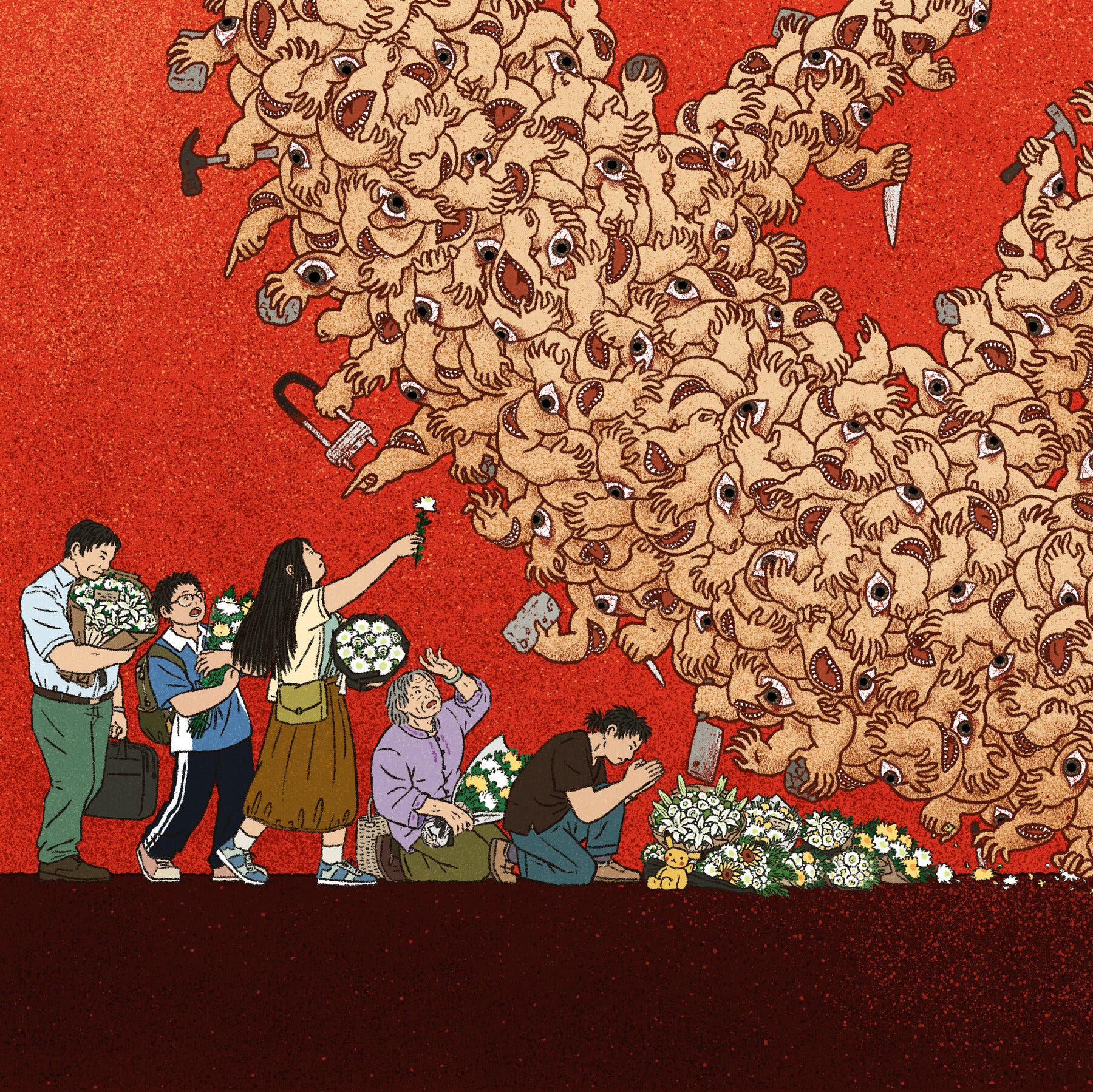
Seeking Truth from Facts: Bias and Fallacies in Reported Tragedy
During the 2024 California wildfires, comments such as “Wildfires burn in California every year, while in China they are put out in seconds. Why is the gap so big?” are akin to an uncontrolled blaze inside China’s “Great Firewall.” The 2024 California wildfires are an ongoing and devastating event. According to NBC News, “At one point there were close to 200,000 people under evacuation orders as crews tried to battle back the fires.”[1] Due to climate and geography, wildfires are inevitable across the state of California, especially during the dry seasons of spring and summer. However, it is in the interest of the Chinese, Russian, and other authoritarian governments to portray to their populace that Western countries, especially the United States, are in crisis and mismanaged. The crisis is being treated as conclusive evidence that the Western system and society are broken. While news coverage around the world is objective on the issue, disasters are inevitable globally. Chinese state media relish cherry-picking comparisons between China and the United States, while glorifying the Chinese government. In reviewing news sources from the perspective of NBC News, Xinhua News Agency, and RIA Novosti, NBC took an objective and unbiased approach, while Xinhua and RIA Novosti, along with other state-owned news networks, show indicators of spreading misinformation.
Firstly, NBC News is more objective on the issue. In their article “California wildfires: What we know about L.A. area fires, what caused them, who is affected and more,” they state, “[the fire was] fueled by powerful winds and dry conditions … and roared across the Los Angeles area.”[1] The article shines a light on the victims of the tragedy, the city’s response, and the locations affected. As the fire spreads to Palisades and Eaton, NBC is very objective when it comes to its reporting on the issue, simply stating facts and numbers. The fire is inherently not political, but other outlets have attempted and succeeded to frame it in a way that aligns with certain narratives, such as policies on climate change, the government response, or urban planning. While NBC News takes an objective and informative approach, other sources have been noted to emphasize different lenses, such as potential mismanagement or environmental regulations. Media framing can shape public perception, even when reporting on seemingly neutral events like natural disasters, a tactic blurring the line between journalism and propaganda. When news networks choose to highlight certain aspects over others to further certain narratives, they fall under the umbrella of the logical fallacy of cherry-picking.
This contrast in coverage becomes evident when it comes to China, where independent journalism is outlawed. State-owned news network Xinhua appears as the second result when searching for 'California wildfires' in Chinese. The article is titled “International News Watch | U.S California Mountain Fire’s ‘Natural Disaster’ and ‘Human Disaster.’" It states, “Behind the raging and spreading of the mountain fires is the malfunctioning of the management of the U.S. federal and local governments and the systemic failure of the national governance system”.[2] The article places an overwhelming emphasis on discrediting the United States government, in a way that poisons the well and gives readers the impression that the wildfires are primarily a result of governmental mismanagement rather than natural causes. It reinforces this sentiment by listing off similar tragedies, such as Hurricane Katrina, Woolsey and Camp Creek Fires, Winter Storm Uri, and the 2023 Hawaii Wildfires. Other Chinese state media compared the disaster with China’s response to the 2025 Tibet earthquake, cherry-picking comparisons to portray China's response in a more flattering manner.[3]
The bias in China's response becomes more evident when compared to how Chinese state media portrays its own government. Yet, this carefully constructed facade fails to fully obscure the fact that China's disaster response continues to suffer from severe inefficiencies, plagued by tangible human disasters that Xinhua so vehemently criticizes. In instances such as the 2008 Sichuan earthquake, a political dispute between the army commander and the premier led to a three-day delay in critical rescue efforts. With the government refusing to accept any foreign aid or help during the immediate aftermath to maintain its Potemkin image of self-sufficiency, this resulted in missed opportunities to save lives.[4] It is in the interest of the communist government of China to put out propaganda and disinformation to its populace to discourage emigration and anti-regime sentiment. It justifies its existence and rule by simultaneously criticizing and comparing itself to the West, while also seeking legitimacy through the West’s recognition. It utilizes a language barrier and selective censorship to claim deniability. The disinformation campaign on the California Wildfires is simply a constituent of the never-ending propaganda cycle assuring the Chinese people that there is “nothing to envy.” According to another source that discusses the use of logical fallacies in media, the article “Defining ‘Fake News’: A Typology of Scholarly Definitions” explains that misinformation comes in many forms, ranging from small exaggerations in advertisements to rival geopolitical nations trying to influence discourse.[5] Recognizing fake news and staying informed is a responsibility, especially since the privilege of learning about disinformation tactics is often deprived from people under authoritarian systems.
In addition to China’s coverage of the situation, Russian state media RIA Novosti also exploits the wildfires in California to push anti-US and anti-Ukraine propaganda. RIA Novosti, along with other state-owned agencies draws a parallel between California’s inmate firefighter program and China’s use of forced labor, accusing the U.S. of hypocrisy for condemning China’s subjugation of the Uyghur minority in forced labor practices in Xinjiang.[6] RIA Novosti’s argument falls under the tu quoque fallacy, as instead of addressing forced labor practices in China, it argues on a “whataboutism” basis by pointing to the inmate firefighter program, suggesting that the U.S. has no right to criticize China. At the same time, the claim about human rights violations in China was not refuted, but the focus was merely shifting. California’s inmate firefighter program in comparison to China’s forced labor camps is vastly different. Californian inmates serve in the program on a purely voluntary basis, and checks on their physical fitness and behavioral records are in place to ensure proper oversight. Meanwhile, the Xinjiang region is governed under a “guilty until proven innocent” presumption, in which the Chinese government uses ethnicity, religion, and perceived dissent to justify mass surveillance and arbitrary detention under the facade of combating extremism.
Furthermore, Russian coverage of the wildfires pushes an anti-Ukraine narrative, reinforcing the Kremlin’s rhetoric that supporting Ukraine’s defense efforts comes at the expense of U.S. citizens by draining resources and worsening the crises at home. Russian state media exploits these anxieties to further its geopolitical agenda. NPR reported on the issue in an article titled “Russia Tries to Use California Fires to Discredit Ukraine” highlighting how Russian state media appropriates the wildfire crisis to undermine support for the Ukrainian defense efforts.[7] Russia’s strategic use of propaganda draws parallels to similar tactics from China. That said, it would be wrong to assume that Russia and China are allies. Rather, their interests align due to a shared authoritarian governance style. However, their partnership is one of convenience rather than friendship, as they would readily undermine each other if significant benefits arose. This dynamic is evident in their propaganda strategies, as both relish exploiting humanitarian crises to push anti-Western narratives, yet they do so in ways that serve their geopolitical interests rather than out of mutual loyalty.
The media coverage of the 2024 California wildfires, in NBC News, Xinhua, and RIA Novosti is an example of how news can be politicized to promote political agendas. While outlets such as NBC News maintain an objective and fact-based approach, state-controlled media such as Xinhua in China, and RIA Novosti in Russia distort the truth from facts to serve geopolitical agendas. While disasters are inevitable around the world, not every news outlet is equitable. Some are backed by hostile governments that wish to see the dismantling of democratic systems and remain inconsiderate regarding methodology. They do so by utilizing logical fallacies such as cherry-picking and tu quoque, while its citizens are either not taught or blinded by nationalism to recognize such fallacies. The exploitation of crises for propaganda far predates contemporary times, but in an era where misinformation is facilitated by an unprecedented age of information, media literacy becomes essential. Seeking credible sources, questioning narratives, and the ability to recognize bias is the Achilles' heel of disinformation, undermining its influence both within authoritarian regimes and beyond.
[1] "California Wildfires: What We Know About the Palisades, Eaton Fires in Los Angeles"
NBC News. 8 Jan. 2025
https://www.nbcnews.com/news/us-news/california-wildfires-what-we-know-palisades-eaton-los-angeles-rcna188239[2] “国际观察丨美国加州山火的'天灾'与'人祸'”
Xinhua News Agency, 25 Jan. 2025
www.news.cn/world/20250125/a2675fbe27d0464ea060789015a732c6/c.html[3] "How California's Wildfires Are Fuel for Propaganda"
Coda Story. 16 Jan. 2025
https://www.codastory.com/disinformation/how-californias-wildfires-are-fuel-for-propaganda[4] "Quake Revealed Deficiencies of China's Military"
The New York Times. 2 July 2008
www.nytimes.com/2008/07/02/world/asia/02china.html[5] “Defining ‘Fake News’: A Typology of Scholarly Definitions”
Digital Journalism, 30 Aug. 2017, 6:2, 137-153,
DOI: 10.1080/21670811.2017.1360143[6] "Russia Exploits Wildfires in Los Angeles to Push Anti-US, Anti-Ukraine Propaganda"
Voice of America. 16 Jan. 2025
www.voanews.com/a/russia-exploits-wildfires-in-los-angeles-to-push-anti-u-s-anti-ukraine-propaganda/7938909.html[7] "Russia Tries to Use California Fires to Discredit Ukraine"
-

Senkaku Dispute: Sino-Japanese Relations
The Dispute Over Rocks ... -

Seeking Truth from Facts: Bias in Tragedy
California wildfires and China ... -
.png)
北京高中一学生被同学用剪刀连刺太阳穴
教委学校冷漠回应家长实名曝光
